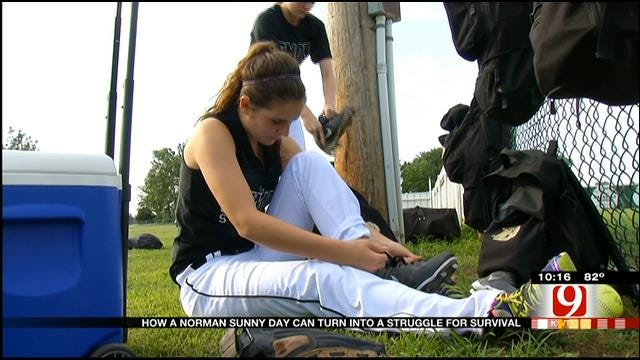Oklahoma Teen Survives Heat Stroke, Warns Others
Oklahoma and extreme heat go together. It's a dangerous combination that one Oklahoma teenager experienced.Thursday, July 24th 2014, 5:40 pm
Oklahoma and extreme heat go together. It's a dangerous combination that one Oklahoma teenager experienced.
Stephanie Wilburn, 17, says what seemed like a normal summer day for her a few years ago suddenly turned into a struggle to survive. Wilburn is like many girls her age, full of energy and the picture of health.
But three years ago, during a routine two-a-day softball practice, something went horribly wrong.
"About an hour-and-a-half into practice, I started feeling really, unusually tired," said Stephanie Wilburn, heat stroke survivor. "I was like, 'No, I need to push through, I need to be strong.'"
Pushing through her exhaustion in the triple-digit temperatures and humidity, her condition grew more serious.
"The next thing I knew, I was in the dugout and my coaches were trying to make sure I was okay," she said.
It's the beginning of a heat stroke - the most serious and often deadly heat illness.
"I'd stopped sweating at that point, gone pale or gray in the face and it just went downhill from there," Wilburn said.
Common Signs of Heat Stroke:
- Throbbing headache
- Dizziness and light-headedness
- Lack of sweating, despite the heat
- Red, hot and dry skin
- Muscle weakness or cramps
- Nausea and vomiting
Under the care of doctors, it took her weeks to recover. These days, her tolerance for heat is drastically lower and she is susceptible to relapse into heat-related illness. While staying hydrated is vital, it certainly won't make you invincible from the intense summer heat, whether you're a competitive athlete on the field, enjoying a neighborhood park or working in the heat, you have to listen to your body for the signs of stress.
"Heat cramps are kind of that precursor to everything," high school trainer, Dan Newman, said.
Newman's job is to watch over hundreds of athletes and any signs of heat exhaustion or heat stroke.
"You're going to start feeling a little dizzy, nauseous, you can't focus on anything, blurred vision," said Newman. "And that's what we'll look for, kids stumbling around, just not being able to keep up."
Newman also uses an instrument to measure the environment before, during and after practice. The instrument uses heat index values to log and determine the amount of heat stress the players could face. Coaches can even use a special pill that a player swallows with a remote device that can measure their core temperature to prevent a heat stroke.
"I'm 17, and I know, sadly, I'm going to have the effects of heat exhaustion and heat strokes the rest of my life," Wilburn said.
Along with staying hydrated, you also need to eat a low-sodium meal before getting out in the heat.
Heat Stroke Prevention Tips:
- Wear lightweight, light-colored, loose-fitting clothing
- Wear a hat or use an umbrella
- Drink water before going outdoors
- Drink more water or sports drinks while outdoors
- Plan outdoor activities during morning and evening hours
- Avoid caffeine and alcohol
- Use sunscreen
More Like This
July 24th, 2014
November 13th, 2024
October 28th, 2024
October 17th, 2024
Top Headlines
December 25th, 2024
December 25th, 2024
December 25th, 2024














